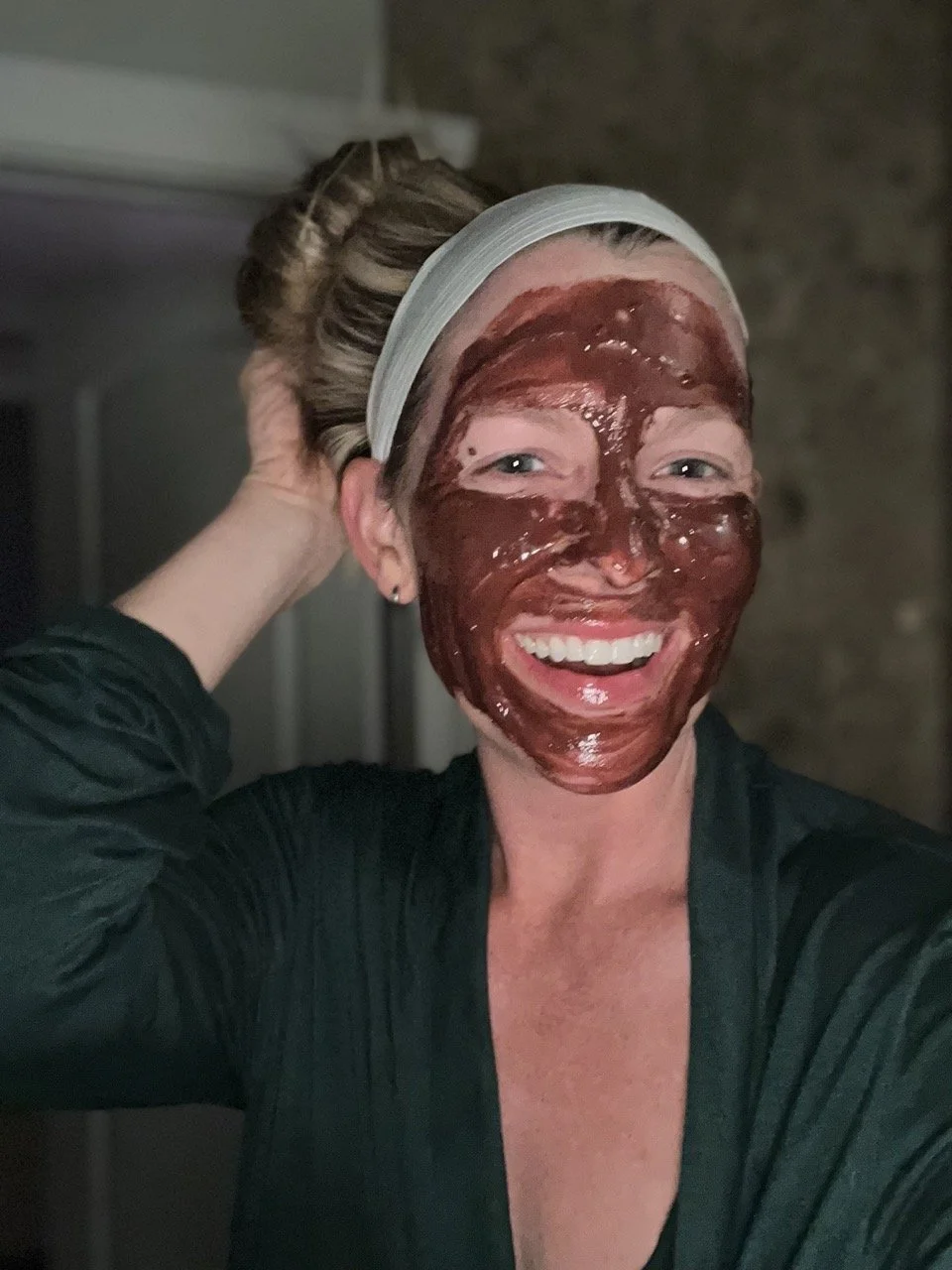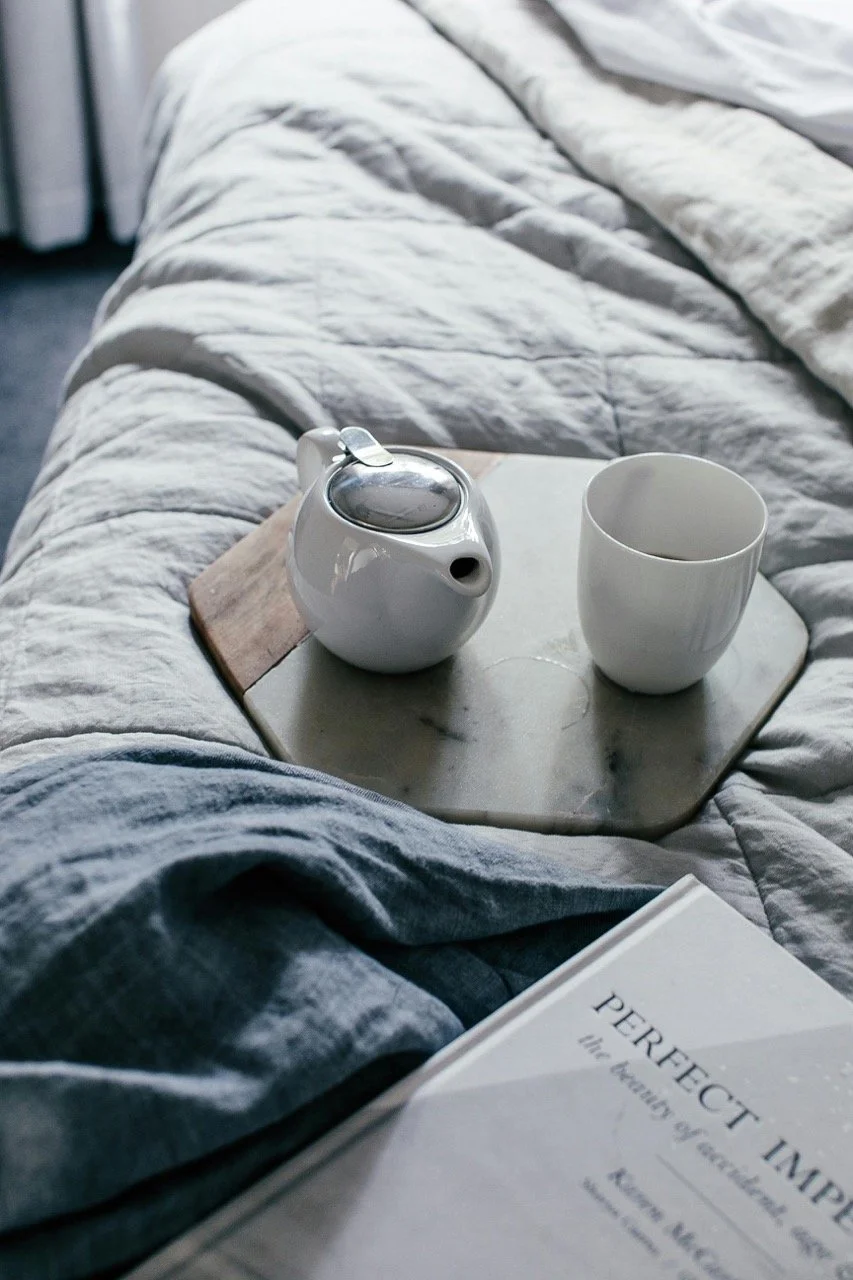EASY AT HOME PRACTICES TO RELIEVE STRESS AND RESTORE SLEEP
Last week I gave you my 12 lifestyle detoxifying methods, and this week as promised, I will share with you the stress management and sleep optimization tools.
Now, this is a biggy. A leading cause of weight struggles that I find among clients is stress and lack of sleep. They go hand in hand and can shape everything in your life without you even realizing it.
I’m probably talking to a lot of busy, professional women here - maybe with families, crazy social lives or non-stop travel calendars - who think you really don’t have time for anything extra! The techniques I share here will help you to find the space in your long days to manage your stress and optimize your health.
Here’s How to Minimize Stress and Optimize Sleep
I am strict with following at least two of these practices everyday. I appreciate it might feel like you don’t have time, but where could you find 15 minutes in your day? Could you check Instagram a little less? Set your alarm earlier? Combine practices with say, a walk to work or waiting for your dinner to bake?
I recorded a talk on temptation bundling, find the video at the end of this blog! It will help you to shift space around in your calendar and combine new habits with tasks you already do.
For each practice, I have set an approximate time to give you an idea of how you could slot it into your day. They are estimates and will vary for each person, I’ve put them in order so you can work through them and build up your timings!
7 Techniques to Reduce Your Stress
First, here are my methods to reduce stress. Remember, they may not ALL be for you but why not try them and see the results before you decide?
Gargling: 30 seconds - 2 minutes
It may sound weird but hear me out.
Gargling (with water or singing) for 10-20 seconds at a time activates the vagus nerve. This nervous system counteracts the fight or flight state, allowing our bodies and brain to relax. We enter the fight or flight state at times of high stress - ever wondered why you’re so jumpy one day? That’s why! It’s a symptom of stress you might not have paid attention to. Being in extended periods of fight or flight stage can have detrimental physical effects such as high blood pressure and migraines.
Give gargling a try and see how it affects your mood throughout the day.
2. Cold Showers : 40 seconds to 4 minutes
This is one you CAN do daily! Ideally this would be for a few minutes, but even just a 40 second blast at the end of your shower can make all the difference. It can help metabolism, the immune system, depression symptoms and circulation.
As an added bonus, washing your hair in cold water can reduce frizz and stimulate hair growth. Seriously, what’s not to love?!
First step cold shower, next step ice baths!
3. Deep breathing practise: 2 - 10 minutes
Fun fact: Our body is designed to release 70% of its toxins through breathing. If you're not completing deep breathing you're not releasing toxins.
One of my favorite practitioners is Wim Hof, he makes breathing practices so accessible and easy to slot into your day. You can even do deep breathing exercises while driving, such as the square method (in for 4, hold for 4, out for 4, hold for 4, you can change the increments). It will calm you down, help with energy levels, digestion, mood and more.
4. Gratitude Practices: 5 - 15 minutes
It’s so easy to take things for granted throughout the day. I like to take stock of everything I have to be grateful for and write it in a journal (more on this below). This is a beautiful practice to look back on but to simplify it, you can consider your gratitude while driving to work or watering the plants. In turn, this calms the mind and offers perspective even in the most stressful week.
One thing I like to do is ask my husband at dinner, what were the three best things in your day? You can always find 3 and your kids will love it.
5. Meditation: 5 - 30 minutes
Since I introduced daily meditation practices, I have had a clearer mind and calmer body throughout the day. It took a while to get into it, so I urge you to stick with it - I’m now at the point where I can’t imagine not meditating!
There are a heap of apps that can guide you but it can be as simple as sitting in silence or with gentle music and candles for 5-15 minutes. I like to meditate in the morning but it is also a powerful tool to aid sleep (it will also keep you off your phone at bed time!).
Welcome your thoughts, accept them and then put them to one side calmly, one by one. It can help to focus on your breathing, as outlined above or try yoga nidra to ease you into the meditation mindset.
6. Dedicating down time daily: 10 minutes +
I hear a lot of excuses over this one and trust me, I totally get it. I am a full time mom with a business of my own, I understand ‘too busy’. But you won’t be able to function as your best self if you don’t give yourself space to relax.
You can combine a few of my earlier points from this blog or last week’s to find your down time like a bath or time in nature. Maybe just find 10 minutes per day to read your book on the couch or do a face mask. Life can wait for 10 minutes.
7. Setting and keeping boundaries: A way of thinking
Boundaries are limits we identify for ourselves that support us in feeling fulfilled with our needs and happiness.
We simply can not do it all (at the same time). Which is why we need to identify values, needs and wants to be able to know what we may need to say no to, in order to support our needs and happiness first. A good way to align boundaries can be to work on understanding a need vs a want.
A need supports survival, mental health or physical health which is the foundation of your ability to be your best self. It is something that without, you can not function optimally and therefore needs to be a ‘yes’ first choice.
A want is something that ‘would be nice’, that you may really enjoy, but that ultimately needs to put secondary on the list and is therefore a ‘no’ if needs are not first met.
Consider what you need to function as your best self in a day’s time, how about a week or a month’s time?
Those things are your non-negotiables and the foundation that you should set boundaries to protect. For example, you haven’t slept well in 3 nights, and are asked to a social gathering that you know is going to go way past your bedtime. What do you do?
While of course that social gathering sounds enjoyable and well, FOMO might be hitting, sleep is crucial to being able to function as your best self and because of that need, the want of attending is going to have to be considered less important and therefore a boundary is drawn and it becomes a no.
10 Ways to Set Yourself up For a Restorative Sleep
A vital root of our health, weight and mental wellbeing is good quality sleep, and enough of it! If we just focus on exercise and diet we will only get so far with our weight loss goals. Sleep and stress are tightly linked, with each affecting the other, a chicken and egg situation.
My regimen prior to sleep has had one of the greatest impacts on my body; I focus on slowing my brain, body and breath in a few ways:
Aromatherapy: 60 seconds
Aromatherapy is the practice of using essential oils for therapeutic benefit. It has been used for centuries as a practice to directly support lifting your mood, anxiety, depression, nausea, insomnia, low appetite, dry mouth, and more. A simple whiff can just make you feel good. Even though research is limited in their effectiveness, many claim essential oils are natural remedies for a number of ailments and can alleviate many symptoms.
So, how do they work?
Placing a few drops of the scent on a specific body part, common areas are below the ear or wrist. When inhaled, the scent molecules in the essential oils travel from the olfactory nerves in your nose directly to the brain impacting the amygdala, which is the emotional center of the brain, and within time and with practice, creating an outcome like those listed above.
2. Gentle moisturizing or dry brushing routine: 2 - 10 minutes
Dry brushing is a technique I use before a shower once a week or every few days. It’s literally as it sounds: use a dry brush against the skin, brushing towards the heart and lymph nodes. It’s great for exfoliation, detoxification and circulation.
Moisturizing is such a simple practice, it will literally add 2 minutes to your shower routine. Choose a scent you love, with ingredients you’re happy to have on your skin (remember it’s our largest organ and absorbs all that we put on it!). Lavender, chamomile and jasmine all have calming effects.
Combine these with a steam shower, bath or tea and you have yourself a mini spa!
3. Humming: 1 - 5 minutes
Similar to gargling, this activates the vagus nerve. But there are a couple of other surprising benefits! You can increase your nitric-oxide levels through humming which can increase your cardiovascular health, and reduce inflammation.
One result and cause of stress can be lack of sleep. Interestingly, humming releases melatonin (much like a lullaby) which signals to your brain that it is time to sleep. You may feel silly at first, but you don’t have to hum a tune - try just an ‘om’ like you may have done at the end of a yoga practice and see how it makes you feel.
4. Brain dump - journaling anything and everything on my mind: 5 - 20 minutes
Do you find that as soon as you lie down to sleep your brain is like “oh, HI, now we have time to solve ALL of the day’s issues!”
Me too. It’s probably the first time in the day we’ve given our minds the space to wander. Before, I would lay there and run through all the answers I couldn’t come to during the day, to think ‘I must remember that when I wake up’. Then I thought, if I can’t sleep with my whirring brain, why not write it all down before bed?
I may not do this everyday, and sometimes I find the best time for me is actually Sunday morning while my son is napping. It can depend on how much I have going on in my life. It is a perfect practice for alleviating stressful thoughts, quizzical thoughts, for making decisions or for recording memories you don’t want to forget!
5. Meditation or deep breathing: 5 - 30 minutes
There are apps and podcasts you can use to gain confidence and help train your thoughts until you’re ready to meditate alone. As outlined above, it can work best for people as a morning routine to start the day off with calm or to ease them into restful sleep. Try both and see what works - you could also alternate this practice with the 30 minutes of reading (below!).
6. Steam shower or bath and tea: 10 - 45 minutes
We probably don’t all have the luxury of having an at home steam shower (I certainly don’t!) but I do love a steam room session at my gym or I run a hot bath. The steam relaxes the muscles and literally soaks stresses away. It can help with circulation and muscle pain too.
No steam shower and no bath? Herbal tea can work wonders. Opt for caffeine free and as natural-a brand as you can find, I love Pukka, they offer blends especially for sleep, digestion and calm. The steam just from your mug can have calming effects before you even start drinking!
7. Reading before bed: 30 minutes
I used to read non-stop when I was little, then with the increase of technological distractions and life-stresses, I found it harder to focus. I would procrastinate or skim-read paragraphs meaning I couldn’t get a true understanding of the words.
As soon as I began setting aside 30 minutes before bed each night, I found I got into a flow state. I now take in more of the information or get absorbed in the characters of novels. As well as easing my brain into a peaceful sleep, it’s also increasing my concentration throughout the day by training my brain to focus.
I try to mix up my reading list between novels and nonfiction. I believe in the importance of imagination for creativity as well as learning about the world. If you want any recommendations, please do get in touch on Instagram!
8. Avoiding blue light before bed: At least 1 hour
We all know this, we have been told countless times but we still do it. I had to get strict with myself. I don’t have a TV in my bedroom and I leave my phone at the other side of the room all night (this also helps with getting up for an alarm!). I can’t believe the difference it has made, honestly!
But why?!
Blue light is on the same light spectrum as that of the sun, so it plays with our circadian rhythm and hormones, confusing our brains about what time of day it is. It increases our alertness, body temperature and heart rate.
Instead of scrolling endlessly through apps, the news or emails, I now read before bed (above!).
9. Prioritizing 8 hours of sleep: 8 hours +!
For some reason, sleep often gets pushed down the list of priorities, but if we made it number one, we would perform better with every other task on there. 8 hours is optimal, more is even better. I know it’s hard if you have a young family, my sleep certainly took a hit for a while, but if you control all the factors you can to achieve the 8 hours, you’re in with the best chance.
Set a bed-time mode on your devices, have a strict bedtime that works with your morning routine and set boundaries to keep it. I find that Oura Ring really helps in tracking the quality of my sleep and therefore it encourages me to prioritize those 8 hours.
10. White noise using my fan: 8 hours
If you live in the city like me (Chicago really never sleeps), then there may be a lot of outside noise that intrudes on your sleep. I sometimes turn on my fan to drown these noises out, while still being able to hear my son if he wakes.
How are you going to reduce your stress and restore your sleep?
Now with an understanding of these practices, it’s on you! Go make time in your day, schedule it into your calendar if you need to. Try a little at first with the simpler techniques then build on these and find your own routine that works for you. Record (in your new journal!) changes in your mood, concentration, digestion, skin, hair, weight, energy and mind.
I would love for you to keep in touch and let me know how these practices work out for you, connect with me here or get in touch with Vital Roots Health Co for further support and advice.
P.S. Don’t forget temptation bundling!
As mentioned at the beginning, a useful tool I have found for finding space in my demanding day is temptation bundling. If you use this and set your boundaries, you will find a rhythm. Have a watch of this video I recorded and try out some of my methods!
I'm talking about temptation bundling and I think a lot of you might find this really helpful in terms of getting yourself to do the things that you should do.
This tactic comes into play when you don't necessarily feel like or even want to do, the things you need to do, to accomplish that thing.
Like what you hear? I have tonnes more mindset mastering videos on my YouTube channel HERE!




